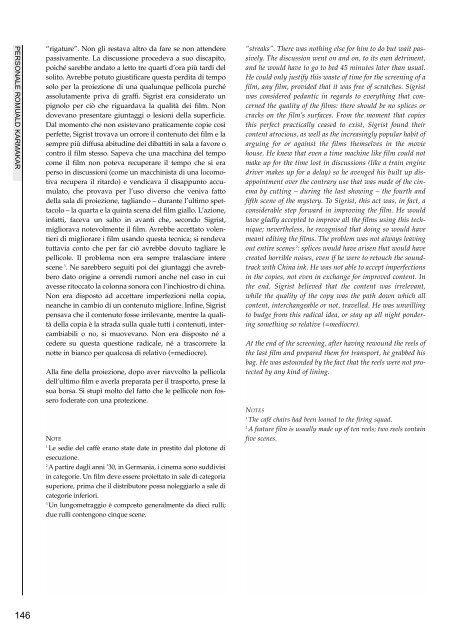Catalogo - Mostra internazionale del nuovo cinema
Catalogo - Mostra internazionale del nuovo cinema
Catalogo - Mostra internazionale del nuovo cinema
Create successful ePaper yourself
Turn your PDF publications into a flip-book with our unique Google optimized e-Paper software.
PERSONALE ROMUALD KARMAKAR<br />
“rigature”. Non gli restava altro da fare se non attendere<br />
passivamente. La discussione procedeva a suo discapito,<br />
poiché sarebbe andato a letto tre quarti d’ora più tardi <strong>del</strong><br />
solito. Avrebbe potuto giustificare questa perdita di tempo<br />
solo per la proiezione di una qualunque pellicola purché<br />
assolutamente priva di graffi. Sigrist era considerato un<br />
pignolo per ciò che riguardava la qualità dei film. Non<br />
dovevano presentare giuntaggi o lesioni <strong>del</strong>la superficie.<br />
Dal momento che non esistevano praticamente copie così<br />
perfette, Sigrist trovava un orrore il contenuto dei film e la<br />
sempre più diffusa abitudine dei dibattiti in sala a favore o<br />
contro il film stesso. Sapeva che una macchina <strong>del</strong> tempo<br />
come il film non poteva recuperare il tempo che si era<br />
perso in discussioni (come un macchinista di una locomotiva<br />
recupera il ritardo) e vendicava il disappunto accumulato,<br />
che provava per l’uso diverso che veniva fatto<br />
<strong>del</strong>la sala di proiezione, tagliando – durante l’ultimo spettacolo<br />
– la quarta e la quinta scena <strong>del</strong> film giallo. L’azione,<br />
infatti, faceva un salto in avanti che, secondo Sigrist,<br />
migliorava notevolmente il film. Avrebbe accettato volentieri<br />
di migliorare i film usando questa tecnica; si rendeva<br />
tuttavia conto che per far ciò avrebbe dovuto tagliare le<br />
pellicole. Il problema non era sempre tralasciare intere<br />
scene 3 . Ne sarebbero seguiti poi dei giuntaggi che avrebbero<br />
dato origine a orrendi rumori anche nel caso in cui<br />
avesse ritoccato la colonna sonora con l’inchiostro di china.<br />
Non era disposto ad accettare imperfezioni nella copia,<br />
neanche in cambio di un contenuto migliore. Infine, Sigrist<br />
pensava che il contenuto fosse irrilevante, mentre la qualità<br />
<strong>del</strong>la copia è la strada sulla quale tutti i contenuti, intercambiabili<br />
o no, si muovevano. Non era disposto né a<br />
cedere su questa questione radicale, né a trascorrere la<br />
notte in bianco per qualcosa di relativo (=mediocre).<br />
Alla fine <strong>del</strong>la proiezione, dopo aver riavvolto la pellicola<br />
<strong>del</strong>l’ultimo film e averla preparata per il trasporto, prese la<br />
sua borsa. Si stupì molto <strong>del</strong> fatto che le pellicole non fossero<br />
foderate con una protezione.<br />
NOTE<br />
1<br />
Le sedie <strong>del</strong> caffè erano state date in prestito dal plotone di<br />
esecuzione.<br />
2<br />
A partire dagli anni ’30, in Germania, i <strong>cinema</strong> sono suddivisi<br />
in categorie. Un film deve essere proiettato in sale di categoria<br />
superiore, prima che il distributore possa noleggiarlo a sale di<br />
categorie inferiori.<br />
3<br />
Un lungometraggio è composto generalmente da dieci rulli;<br />
due rulli contengono cinque scene.<br />
“streaks”. There was nothing else for him to do but wait passively.<br />
The discussion went on and on, to its own detriment,<br />
and he would have to go to bed 45 minutes later than usual.<br />
He could only justify this waste of time for the screening of a<br />
film, any film, provided that it was free of scratches. Sigrist<br />
was considered pedantic in regards to everything that concerned<br />
the quality of the films: there should be no splices or<br />
cracks on the film’s surfaces. From the moment that copies<br />
this perfect practically ceased to exist, Sigrist found their<br />
content atrocious, as well as the increasingly popular habit of<br />
arguing for or against the films themselves in the movie<br />
house. He knew that even a time machine like film could not<br />
make up for the time lost in discussions (like a train engine<br />
driver makes up for a <strong>del</strong>ay) so he avenged his built up disappointment<br />
over the contrary use that was made of the <strong>cinema</strong><br />
by cutting – during the last showing – the fourth and<br />
fifth scene of the mystery. To Sigrist, this act was, in fact, a<br />
considerable step forward in improving the film. He would<br />
have gladly accepted to improve all the films using this technique;<br />
nevertheless, he recognised that doing so would have<br />
meant editing the films. The problem was not always leaving<br />
out entire scenes 2 : splices would have arisen that would have<br />
created horrible noises, even if he were to retouch the soundtrack<br />
with China ink. He was not able to accept imperfections<br />
in the copies, not even in exchange for improved content. In<br />
the end, Sigrist believed that the content was irrelevant,<br />
while the quality of the copy was the path down which all<br />
content, interchangeable or not, travelled. He was unwilling<br />
to budge from this radical idea, or stay up all night pondering<br />
something so relative (=mediocre).<br />
At the end of the screening, after having rewound the reels of<br />
the last film and prepared them for transport, he grabbed his<br />
bag. He was astounded by the fact that the reels were not protected<br />
by any kind of lining.<br />
NOTES<br />
1<br />
The café chairs had been loaned to the firing squad.<br />
2<br />
A feature film is usually made up of ten reels; two reels contain<br />
five scenes.<br />
146
















